2024 International Congress on Medieval Studies: Call for Papers
July 8, 2023 in International Congress on Medieval Studies, Kalamazoo, POMONA, Postal History at Kalamazoo, Societas Magica, Uncategorized
2024 International Congress on Medieval Studies: Call for Papers
59th ICMS (9–11 May 2024)
To occur in ‘hybrid’ form
(with some Sessions in Person, some Online)
[Posted on 7 July 2023, with updates]
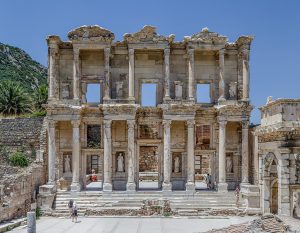
Façade of the Celsus library, in Ephesus, near Selçuk, west Turkey. Photograph (1910): Benh LIEU SONG, via Creative Commons.
Building upon the successful completion of our activities at the 2023 ICMS (see our 2023 International Congress on Medieval Studies Program and 2023 International Congress on Medieval Studies: Report), we announce the Call for Proposals (CFP) for next year’s Congress, which will take place in a modified hybrid format from Thursday to Saturday 9–11 May 2024.
For information about the Congress, see its website. There you can also find information and instructions about submitting your proposals. See especially Submissions. Your proposals for papers are due by 15 September 2023.
After the close of the CFP, we will select the accepted papers and design the programs for the Sessions. Notifying you of the decisions about your proposals will come before the deadline for us to submit the Programs for our Sessions to the Congress Committee is 15 October 2023.
Next, normally by the turn of the year toward the year of the Congress, we publish the selected Programs for our Sessions and announce our other Activities, while we await the promulgation of the official Schedule for the 2023 Congress as a whole. Accompanying our announced Programs are the Abstracts for the Papers. Then, with the publication of the Congress Program (or its traditional ‘Sneak Peek’), we can add the times and venues for our Sessions. As the 2024 Congress approaches, new information can guide announcements and updates on our website and social media.
For 2024, with some Sessions on line and some in person in a transitional ICMS, we prepare:
- four Sessions, sponsored and co-sponsored
- a customary Open Business Meeting at the Congress
- and perhaps a Reception.
In 2024, the RGME celebrates an Anniversary Year, for which the chosen Theme is “Bridges”.
One Session is our own (Item I). With one session each, our co-sponsors for ICMS Sessions in 2024 are:
- Societas Magica
- Polytheism-Oriented Medievalists of North America (P.-O.M.o.N.A.)
- Postal History at Kalamazoo
This year marks Year 20 of our co-sponsorship with the Societas Magica, Year 3 of co-sponsorship with P.O.M.o.N.A., and the first year of co-sponsorship with the newly founded Postal History at Kalamazoo.
Both our own RGME Session (Item I here) and the Session co-sponsored with Postal History at Kalamazoo (Item IV) are designed to continue the tradition of our long-term series of RGME Sessions at the ICMS on “Medieval Writing Materials”, which began in 2014. (See, for example, our Congress Activities and 2022 International Congress on Medieval Studies Program.)
The Organizers and Co-Organizer of the two Sessions this year include all three founders of that series. It was proposed to the RGME Director Mildred Budny in 2013 by Eleanor A. Congdon and David W. Sorenson.
Here we announce the subjects of the Sessions and invite your Proposals for Presentations.
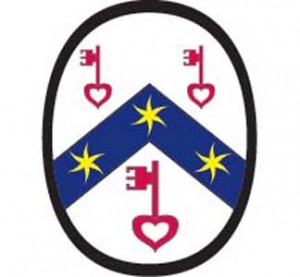 I. “Material Remains
I. “Material Remains
of Medieval and Early Modern
Commerce and Correspondence”
Sponsor: Research Group on Manuscript Evidence
Organizer: Mildred Budny (Research Group on Manuscript Evidence)
Co-organizer: Eleanor A. Congdon (Youngstown State University)
Modality: Online
Function:
Both this Session and the Session co-sponsored with Postal History at Kalamazoo (Item IV below) continue our long-term series dedicated to detailed examination of “Medieval Writing Materials” at the ICMS. (See our Congress Activities and 2022 International Congress on Medieval Studies Program.) Two founders of the series organize and co-organize this Session.
Aim:
The material aspects of medieval accounting (paper, bindings, ink, quills, etc.) have been less thoroughly researched than the methods used, such as double-entry book-keeping, or the historical context of commerce. Little account is given to connect the history of manuscripts, documents, and paper to the history of mercantile activities.
Such collections as the Datini Archives (Prato, Italy), the Fugger Archive (Augsburg
, Germany), the Cely Letters (London, England), the Medici Archives (Florence, Italy, see also Medici Archive Project), and the Simon Ruiz (1525–1597) Archive (Medina del Campo, Spain) offer extraordinary testimony to the range of material aspects of commercial activity in the medieval and early modern periods.
This panel seeks to explore what material evidence survives. How did merchants and their agents chose what materials to use when recording and communicating their transactions? How were those materials gathered and preserved? What do these choices tell us? This panel seeks a more detailed understanding of the documentation itself, specifically the materials used to construct the ledgers and letters surviving today.
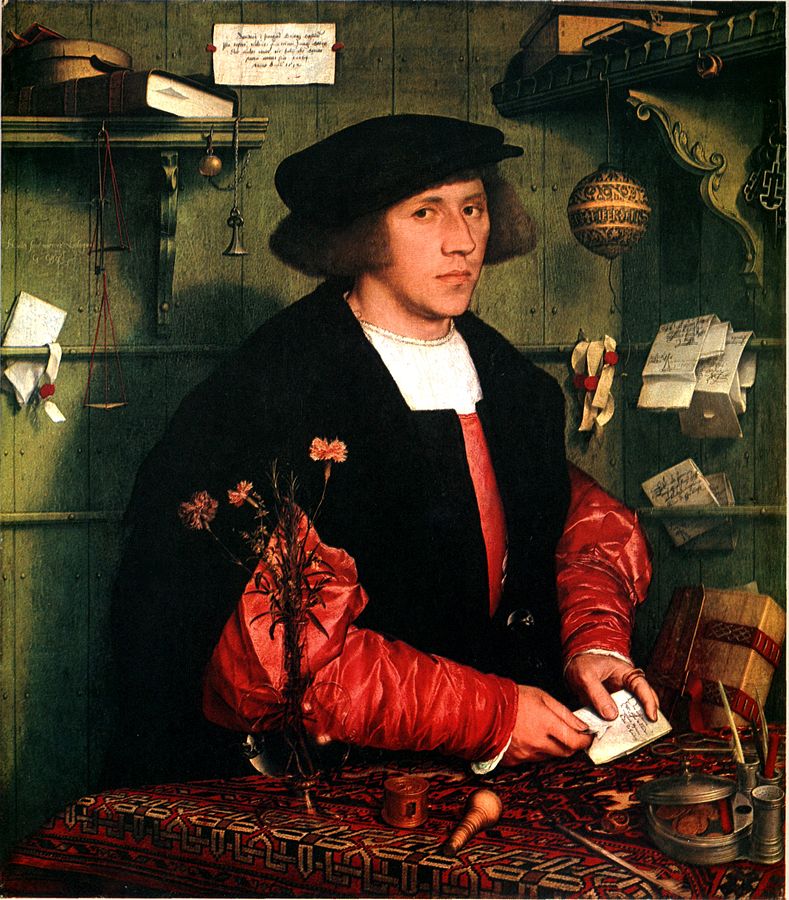
Berlin, Gemäldegalerie. Hans Holbein the Younger (1497/1498 – 1543), oil on oak wood. Portrait of the merchant George Gisze, 1532. Image via Wikimedia Commons, Public Domain.
*****
II. “Power in the Blood”
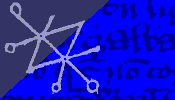
Societas Magica logo
In Year 20 of our Sessions co-sponsored with the Societas Magica, we prepare one such Session.
Sponsor: Societas Magica
Co-Sponsor: Research Group on Manuscript Evidence
Organizers: Rochelle Rojas (Kalamazoo College)
Modality: In person
Aim:
This session invites presentations which consider the power or powers of blood from various perspectives, as revealed by the textual, material, or other sources. We seek to explore such aspects as descriptions of the nature or conditions of blood, invocations of its meaning and potency, blood sacrifice and symbolism, blood and the body/human condition, bleeding and putrefaction, blood pacts, devil’s marks, and vampirism, menstrual blood and love magic, and prohibitions regarding blood.
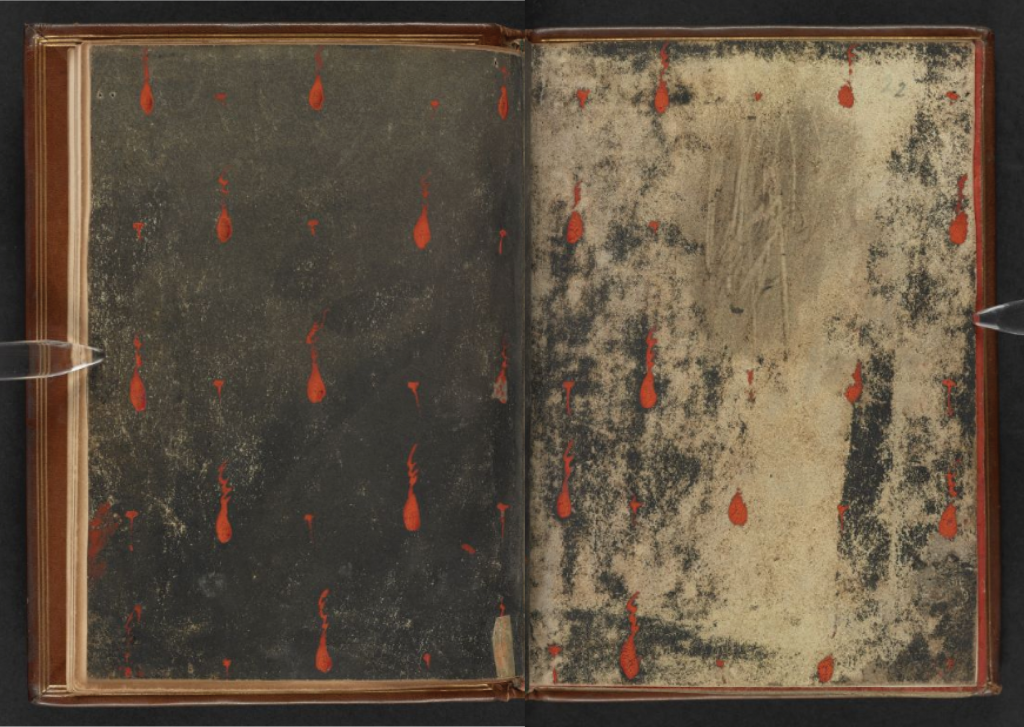
© British Library. Egerton MS 1821, fols. 1v-2r. Devotional compendium, England,
circa 1525-1538, for a Carthusian house.
Note on the Image: On the manuscript, see
*****
III. “Retrospect and Prospect for P.-O.M.o.N.A. . . .
As the Curtain Falls (A Roundtable)”
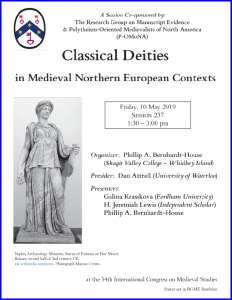
RGME Poster for 2019 Session on “Classical Deities”
Sponsor: Polytheism-Oriented Medievalists of North America (P-OMoNA)
Co-Sponsor: Research Group on Manuscript Evidence
Organizer: Phillip Bernhardt-House
Modality: Online
Aim:
P.-O.M.o.N.A. was founded to provide a specific and dedicated forum for what had been occurring for more than a century in various Medieval Studies disciplines: namely, discussing the use (and abuse!) of medieval sources for understanding the polytheistic practices of pre-Christian Europe. Our events have been varied, but as the organization comes to its final event, we ask: Was it worth it, and is there a future need for this sort of specialized forum in relation to this topic? Our panel of experts will give their opinions, and the audience in attendance will be free to join in the discussion.
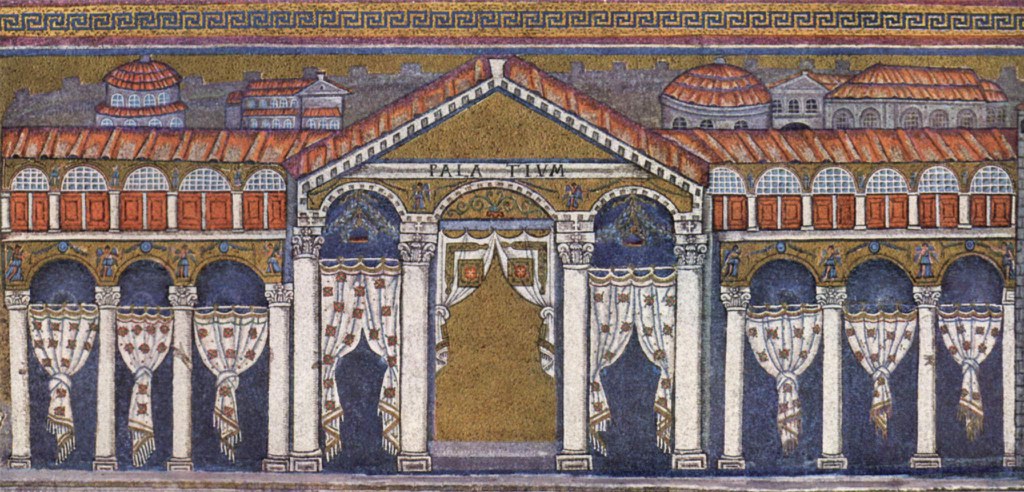
Ravenna, Sant’Apollinare Nuovo, Mosaic depicting the Palace of Theodoric. Artwork in the public domain; photograph provided by The Yorck Project / Wikimedia Commons (GFDL).
It’s Curtains: Notes on the Image and Further Reading
Ravenna, Sant’Apollinare Nuovo, Wall mosaic depicting the palace of Theodoric (454–526), circa 526 CE. Artwork in the public domain; photograph provided by The Yorck Project / Wikimedia Commons (GFDL).
- Eunice Dauterman Maguire, “Curtains at the Threshold: How They Hung and How They Performed,” in Catalogue of the Textiles in the Dumbarton Oaks Byzantine Collection, ed. Gudrun Bühl and Elizabeth Dospěl Williams (Washington, DC, 2019), via Curtains at the Threshold.
*****
IV. “Letters, Couriers, and Post Offices:
Mail in the Medieval World”
Session Co-Sponsored with Postal History at Kalamazoo
Sponsor: Postal History at Kalamazoo
Co-Sponsor: Research Group on Manuscript Evidence
Organizer: David W. Sorenson (Alan Berman, Numismatist)
Modality: In person
Function:
Both this Session and the Session sponsored by the RGME (Item I above) continue our long-term series dedicated to detailed examination of “Medieval Writing Materials” at the ICMS. (See our Congress Activities and 2022 International Congress on Medieval Studies Program.) One founder of the series organizes this Session.
Aim:
The role of mail delivery systems was an important one in the medieval world, whether the West or in other literate parts of the world. Postal history has generally been studied largely as an adjunct to Stamp collecting (see also Stamp Collecting), or as an aid to reading the contents of letters, but not so frequently as a subject in its own right, particularly in conferences such as the ICMS. As such it would perhaps be an appropriate time to consider the “moving of the mail” as a subject of study in its own right.
Mail has played an important part in human activity in literate societies, in the West as elsewhere, since the days of the Sumerians (see Sumer). Providing the primary means of conveying information at a distance, it functions as a vital part of the pre-modern infrastructure. In this session we cover various technical aspects of medieval mail; rather than studying its contents, we will look at its delivery systems in their various aspects. Whether private or governmental, whether involving ‘stamps’ or postmarks, whether private or public, mail helped make the world, and we prepare a session dedicated to studying its role.
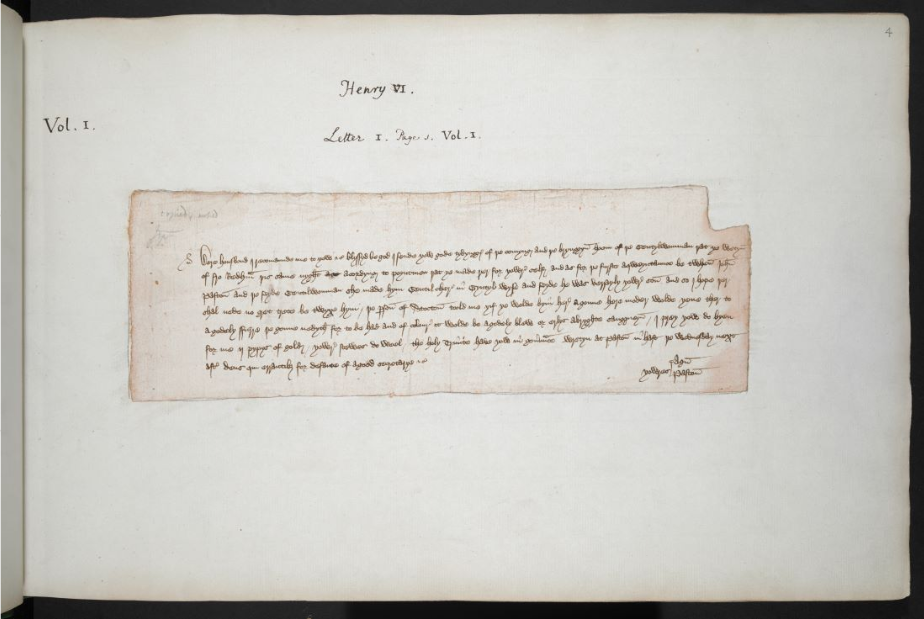
© The British Library. Add MS 43488, f. 4r. Letter from Agnes Paston to her husband, William Paston, Norfolk, 20 April ?1440.
*
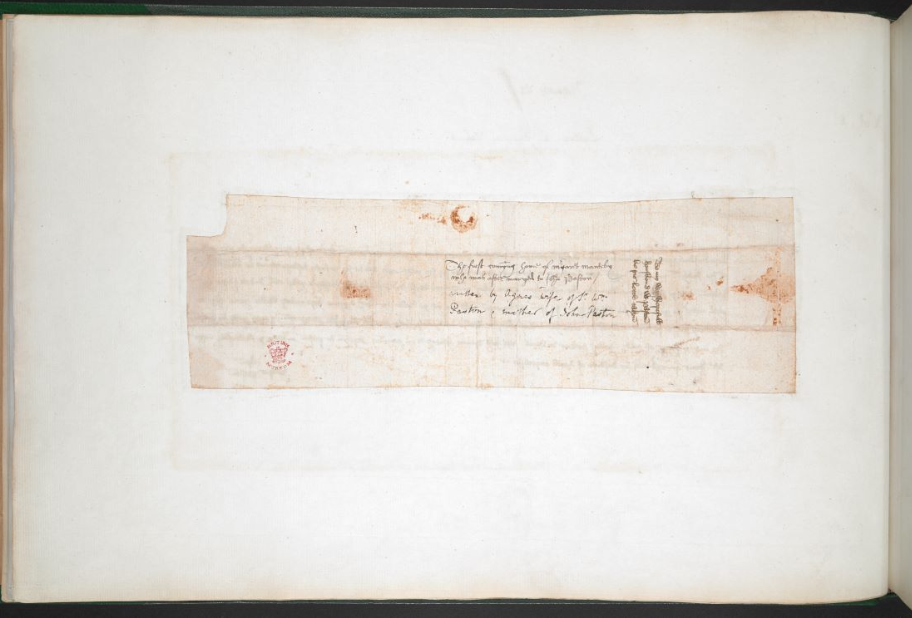
© The British Library. Add MS 43488, f. 4v. Rear of the same letter with address ‘To my worshepefulle housbond W. Paston be this letter takyn” and remains of wax seal.
Notes on the Images and Further Reading
© The British Library. London, British Library, Add. MS 43488, fols. 4r and 4v.
Letter from Norfolk, of 20 April ?1440, by Agnes Barry Paston (died 1479) to her husband, William Paston (1378–1444), with text, address, remains of wax seal, and former folds for its enclosed conveyance to the intended recipient.
“One of the earliest of the surviving letters, dated 20 April, ?1440, is from Agnes Paston to her husband, William, the patriarch of the family, in which she tells him that their son, John (1421–1466), seems to like the ‘gentilwomman’ that his father has chosen to be his bride [Margaret Mautby (died 1484)], and asks him to buy her a wedding gown in ‘a godely blew or ellys a bryghte sanggueyn [red]’. Her mother has promised to supply the fur to go with it. She ends the letter, ‘Wretyn at Paston in hast . . . for defaute of a good secretarye’, so it would appear that this letter was written by Agnes herself.”
*****
Our Congress Sessions
The tradition of Sessions sponsored and co-sponsored by the RGME at the ICMS, in many years of participation in the Congress, both in person and online, is described in our ‘archive’ of Events and Congress Sessions.
- Congress Activities
- Sponsored Sessions at the International Congress on Medieval Studies
- Co-Sponsored Sessions at the International Congress on Medieval Studies
Our tradition includes the publication of Abstracts, as their authors allow, for the Papers and Responses of Sessions sponsored and co-sponsored by the RGME.
You may find individual Abstracts by Name and/or by Year of Presentation in our Lists of
*****
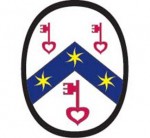 Open Business Meeting
Open Business Meeting
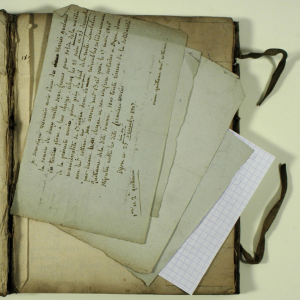
Recettes. Photography by Mildred Budny from a Private Collection.
We plan for 2024 to continue our tradition of in-person Business Meetings at the Congress, with an Open Business Meeting at lunchtime.
Information (“Handouts” for the Meeting, in 1 page each:
As in 2021–2023, in 2024 the RGME will hold an online Pre-Congress Business Meeting within the weeks leading up to the Congress, as a way to prepare for the planning onsite at the Congress. It also gives the opportunity to gather the voices of participants who do not attend the Congress (for example, with interests in other areas) as well as those who do.
See our Business Meetings.
*****
Proposals for Presentations for our 2024 Sessions
To sum up, we welcome your proposal for a presentation — be it a Paper in a Session of Papers (“Material Remains”, “Power of Blood”, and “Letters, Couriers, and Post Offices”) or a contribution to a Round-table (“Retrospect and Prospect for P.-O.M.o.N.A“) at the 2024 ICMS. As noted above, you can submit your proposal through the ICMS website via its Confex system.
Instructions for the steps for submitting your proposal will be described there. After selecting to propose a paper, you can find the Session by searching through the alphabetized list of Sponsors for Sessions.
*****
Coming Events
Watch this space for developments for the 2024 Congress, as the Program takes shape. See 2024 International Congress on Medieval Studies: Planning.
For the RGME Anniversary Year 2024 our Theme is “Bridges”.
For 2023 our Theme is “Materials and Access”. Events include
Episodes in our online series
- The Research Group Speaks
Saturday 8 July 2023 with Michael Allman Conrad
12 August 2023 with Vajra Regan
23 September 2023 with Bridget Whearty
Our Autumn Symposium to be held online on Saturday 23 October 2023.
- 2023 Spring and Autumn Symposia on “Materials and Access”
*****
Please leave your Comments here, visit our Research Group Facebook Page, or Contact Us. We look forward to hearing from you.
Please send in your Proposals for our 2024 ICMS Sessions by 15 September 2023, as described above.
*****
